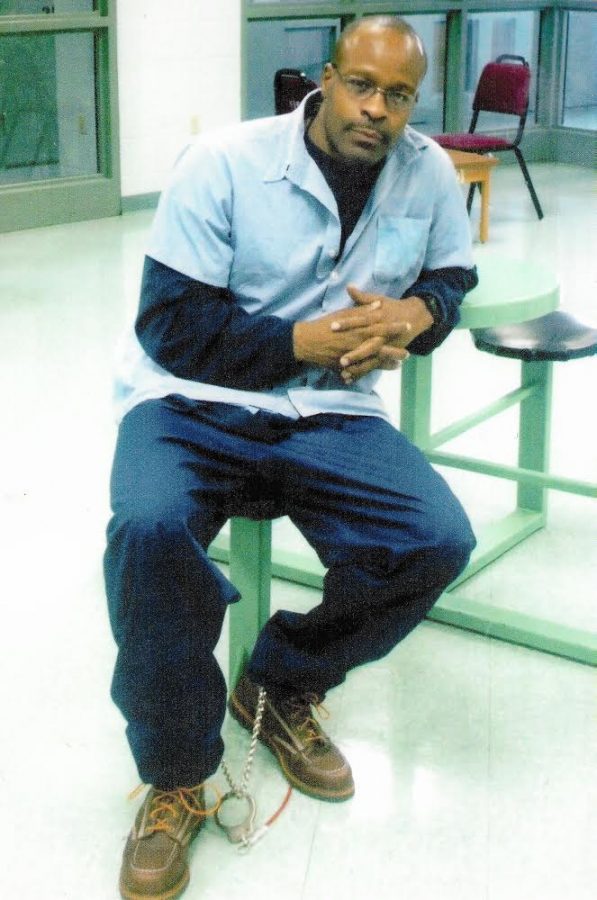Keith LaMar addresses Northwestern community from solitary confinement on death row
Keith LaMar. LaMar has been in solitary confinement for 27 years. He is scheduled to be executed by the state of Ohio in Nov. 2023.
January 20, 2021
Keith LaMar, a death row prisoner currently in his 27th year in solitary confinement, spoke to Northwestern community members in a virtual event hosted by the Northwestern Prison Education Program Tuesday evening.
LaMar called into the Zoom meeting from an Ohio correctional center. LaMar redialed into the meeting every 15 minutes to accommodate prison regulations and was often interrupted by an automated message: “This call is originating from an Ohio correctional facility and may be recorded and monitored.”
Throughout the event, LaMar emphasized the racism and economic inequality at the core of both his own experience as an incarcerated Black man and the justice system as a whole.
“We talk about privilege, about implicit bias, but only in the abstract,” LaMar said. “We don’t talk about (it) in concrete terms: for instance, how a group of armed White people could rush the Capitol without fear of being massacred.”
LaMar was charged with murder and sentenced to 18-years-to-life in prison at age 19 after exchanging gunfire with robbers breaking into his home — a three-story brick building LaMar moved into alone when he was 15. He had been dealing drugs as a means of survival.
LaMar spent four years in prison when a riot broke out, resulting in several deaths. Although state investigators accused him of riot activities, including murder, LaMar said these accusations were false. Evidence that could prove his innocence was forcibly withheld from an all-White jury, which ultimately sentenced him to death. His execution is currently set for Nov. 2023.
“I nearly had a nervous breakdown trying to wrap my mind around what was happening to me,” LaMar said. “But I found out later why I’d been singled out.”
LaMar said since he was currently serving a life sentence but with the possibility of parole, the prosecutors assumed he would “buckle under” when faced with an accusation and take a plea deal.
“That way they could clean their books and be done with the whole thing,” he said.
By this time, LaMar was about to turn 24 and had been incarcerated for almost five years. When he was accused and encouraged to “cop out,” he said he was tempted because, “when you’re poor in this country, it’s not about whether you’re guilty or innocent, it’s about you not having the money to pursue this.” Justice didn’t seem like a reasonable possibility to him.
But LaMar accomplished a lot in his five years in prison. He received his G.E.D, enrolled in college courses and found mentors who “helped me find my way back to myself,” he said. He decided to go to trial.
Since receiving his death sentence, LaMar has been meditating, reading and writing in his cell. A picture of the cell was projected on the slides — a small bed in the corner, with three shelves above it, stuffed with books. He told his story through his book “Condemned” which he dictated, page by page, over the phone. A published copy now sits on a shelf in his cell, in between books by two of his favorite writers: James Baldwin and Richard Wright.
In the Q&A portion, a participant closed the event with a final question: “I want to ask you what you imagine when you imagine freedom,” they said.
“Achieving freedom is a hard walk. It’s something that you’ve got to constantly work at, because you constantly fight against the people that want to keep you in chains, that want to use your life as cannon fodder for their own aims,” LaMar said. “Being free is fighting that, and I’m fighting it. I’m doing it. So I’m free right now.”
Email: [email protected]
Twitter: @binahschatsky
Related Stories:
— NPEP holds roundtable in “Race, Racism, and Policing” series
— Activist Mariame Kaba talks abolition and mutual aid, condemns campus police in Dream Week keynote












